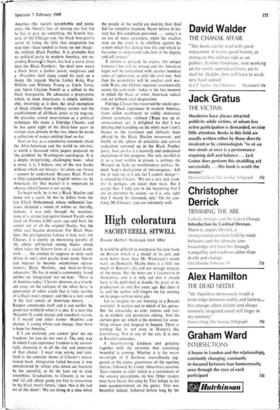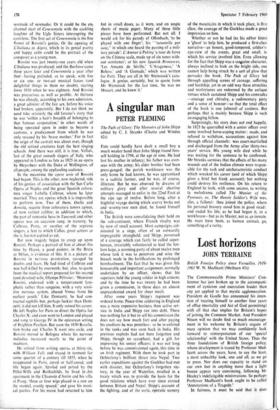High coloratura
SACHEVERELL SITWELL
Rossini Herbert Weinstock (oup 100s)
It would be difficult to overpraise this new book on Rossini which is a model of its sort, and even better done than Mr Weinstock's recent work on Donizetti. Maybe there is a little too much of Rossini's life and not enough analysis of the music. But the notes are a fascination in themselves, and it is only sad that it should have to be published at double the price of its predecessor of only five years ago. But there it is; and the author will forgive me for starting on his pages with no more ado.
Let us imagine we are listening to a Rossini overture! It matters not to which of his operas. But the crescendo, as ever, returns and rises to its strident and percussive ending. And the curtain goes up. which is the moment for some- thing unique and magical to happen. There is nothing like it; not even in Mozart's Die Entliihrung. Not in any of the arts. It is only in Rossini's comedies.
A heartwarming kindness and geniality together with the certainty that something beautiful is coming. Whether it is the warm moonlight of II Barbiere, marvellously sug- gested in the piano, pianissimo of the opening chorus, followed by Count Almaviva's cavatina 'Ecco ridente in cielo' which is a ravishment of the sensory perceptions, no less. Other readers may have heard this sung by Tito Schipa to his own accompaniment on the guitar. That was beautiful indeed; followed before long by the serenade of serenades. Or it could be the en; chanted start of Cenerentola with the cackling
laughter of the Ugly Sisters interrupting the cantilena. The first act of Cenerentola is the fine flower of Rossini's genius. Or the opening of L'ltaliana in Algeri, which in its genial poetry and happy calm could be the portrait of the ,composer as a young man.
Rossini was just twenty-one years old when L'Italiana was produced; and the Barbiere came three years later and Cenerentola a year after that—having preluded, so to speak, with five or six one- or two-act musical farces (and delightful things in them no doubt), starting from 1810 when he was eighteen. And Rossini was precocious as well as prolific. At thirteen he was already, according to his own admission, a great admirer of the fair sex, before his voice had broken, apparently. But I do not think we need take seriously the old farceur's story that he was 'within a hai•r's breadth of belonging to that famous corporation,' in other words of being operated upon in order to become a castrato, a predicament from which he was only rescued by his 'brave mother.' For in fact the reign of the castrati was about over, though the old retired creatures kept the best singing schools. And there was still, it is true, Velluti, last of the great eunuch singers of Italy, who appeared in London as late as 1825 in an opera by Meyerbeer with the Duke of Wellington, of all people, among the applauding audience.
In the meantime the opere serie of Rossini had begun. This is the other, now neglected, side of his genius, of association with the San Carlo Opera at Naples and the great Spanish colora- tura singer Isabella Colbran, whom he later married. They are operas which it is impossible to perform now. Two of them, Otello and Armida, require three coloratura tenors apiece, of now extinct calibre; in addition to which, the part of romantic hero in Tancredi and other operas was on occasion sung, in travesty, by Colbran, Pasta, or another of the soprano singers, a feat to which Callas, great actress as she is, has not aspired as yet.
But now tragedy began to creep up upon Rossini. Perhaps a portrait of him at about this time by Hayez, a good painter, in the Brera at Milan, is evidence of this. It is a picture of Rossini in nervous prostration, ravaged by doubts and fears. He had tired of Colbran and was half-killed by overwork; but, also, to quote from the medical report prepared for his second (and devoted) wife, Olympe issier : 'Monsieur Rossini, endowed with a temperament lym- phatic rather than sanguine, with a very sensi- tive nervous system, abused Venus from his earliest youth.' Like Donizetti, he had con- tracted syphilis but, perhaps luckier than Doni- zetti, it did not kill him. It only ruined his career. He left Naples for Paris to direct the Opera for Charles X; and even went to London and played and sang to George IV in the epicurean setting of Brighton Pavilion. But soon the 1830 Revolu- tion broke out. Charles X went into exile, and Rossini moved to Bologna where his nervous maladies increased nearly to the point of madness.
He retired from writing operas at thirty-six, with William Tell; and stayed in torment for some quarter of a century till 1855, when he reappeared in Paris, cured or half-cured, and life began again. Spoiled and petted by the Pillet-Wills and Rothschilds, he lived in his apartment in the Chaussee d'Antin and his villa at Passy, 'three or four wigs placed in a row on the mantel, evenly spaced,' and gave his musi- cal parties. For his music had returned to him
but in small doses, as- it were, and on single sheets of music paper. Many of these little pieces have been performed. But not all. I would ask for his parody of Offenbach, `to be played with one finger'; his "'tarantella pur sang," in which one heard the passing of a mili- tary parade'; L'Amour a Peking 'a tour de force on the Chinese scale, made up of six tones with- out semitones'; or his new Spanish Romances, 'Les Amants de Seville,' L'Aragonesa,"A Bolero,' and 'A Grenade,' which was written for Patti. They are all in Mr Weinstock's cata- logue. A genius, certainly, but to quote from Mr Weinstock for the last time, 'he was no Mozart, and he knew it.'







































 Previous page
Previous page